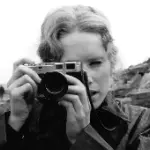1. This three-hour movie essentially explores the inner struggles of an individual when they discover they can influence history and how the world perceives them.
2. Female characters are thinly portrayed. Even the two supporting female roles have little room for development. Emily Blunt plays Kitty, the wife who cheated on her husband with Oppenheimer and got pregnant, leading to a hasty marriage. But this is not surprising because she knows what she wants. She is willing to face difficulties with her husband. Florence Pugh plays Jean, Oppenheimer's ex-girlfriend and lover, who has more in common with him. She knows about his Bhagavad Gita and even inspired the name Trinity for his atomic bomb experiment.

3. The editing and sound effects contribute significantly to a powerful impact. Especially the atomic bomb explosion scene, the combination of visuals and audio delivers a profoundly striking effect.
4. Truman, as a politician in the movie, has a statement that makes a point. During a meeting with Oppenheimer, Truman praises his contributions. However, Oppenheimer accidentally spoke his mind, saying, "I feel like I have blood on my hands". Truman immediately changed his attitude and said, "they did not care who made the bomb. They care who dropped it. And that person is me."
5. Cillian Murphy finally played the lead role in Nolan's movie. I don't know why Nolan didn't choose Matthew McConaughey this time, perhaps because the latter exudes Southern charm, while Murphy has a face full of broken feelings. Murphy is sure to receive an Oscar nomination next year.
6. From the actors themselves to the characters they played, all the supporting roles are well-known. The appearances of Einstein, Bohr, Heisenberg, and Feynman showcase the final golden era of human physics and chemistry.

Now, let's go back to the first point. What exactly does this movie say?
Oppenheimer, the acknowledged father of the atomic bomb, was contradictory. He was born into wealth, charming and talented, and had a way with women. But at the same time, he was belligerent and arrogant, having attempted to poison a teacher when he was young. He was patriotic and exerted all efforts to manufacture nuclear weapons, yet he was also influenced by Indian Buddhism, feeling that his hands were stained with blood. In his beloved Bhagavad Gita, destruction, creation, and rebirth are all manifestations of time and the inevitability of history.
Nolan is a master, and I believe no one captures the scene of the atomic bomb experiment better than him: on the eve of Potsdam, a team under tremendous pressure, in the dark of early morning in New Mexico, a flame never before seen by humans leaps into the sky after a downpour. All around is infinite silence, with only the heavy breathing of humans behind ultraviolet sunglasses. Soon, a thunderous roar rings in the ears of observers at different distances from the site. Some laughed, some cried, and many were bewildered. Oppenheimer later described his innermost feelings in public, quoting from the Bhagavad Gita: Now I am become Death, the destroyer of worlds.
It is impossible for him not to know the consequences of creating the atomic bomb. It was a groundbreaking invention, but unfortunately, also a groundbreaking weapon of mass destruction. His self-justification was that he did not know if his actions were right, but he knew he could not let the Nazis do it first. This logic is understandable both logically and emotionally. However, in reality, I think he was fascinated by the position of standing on the edge of history: he knew his hands had pushed humanity into depravity, and he had opened Pandora's Box. Perhaps there’s even a hint of fascination in the guilt because it represented that he was the chosen one by history.

Another highlight of the film was the celebration that Oppenheimer walked into on the day the first bomb was dropped on Hiroshima. Deafening cheers filled the air, and women were ecstatic. While in his mind, screams, the blinding light of the explosion, and skin peeling off from radiation, appeared. These two images merged together, which was the scene after Pandora's Box was opened.
Oppenheimer's contradictions and complexities, combined with the influence of his wife and girlfriend's left-wing ideas, made him a target of the post-war McCarthyism pursuit. Truman sought a patriotic image, McCarthy pursued Cold War interests; and Oppenheimer stood in opposition to both. The film goes great lengthes to portray the Atomic Energy Commission Chairman Levis Strauss’s relentless inquires and revocation of Oppenheimer's national security clearance.
This is a greater contradiction of the era imposed on individuals and the path he chose when he decided to lead the Manhattan Project. He asked Einstein the second time he visited him in the movie, "Do you remember the first time I came to see you? We talked about our formula and how it told us we had little chance of destroying the world". Einstein replied, "I remember". Then Oppenheimer said, "We have already destroyed the world".

The movie reminded me of the play Copenhagen I saw years ago, which tells the other side of the story of the atomic bomb: a crucial conversation between Heisenberg, the head of German atomic bomb research, and his teacher Bohr in Copenhagen. The connection between Copenhagen and Oppenheimer is Bohr.
In the film, Bohr was rescued by the Allies from Denmark, and he clearly told Oppenheimer that he was not able to assist him in making the atomic bomb. Heisenberg and Oppenheimer, both deeply involved in worldly matters, stood at opposite ends of history and wrote the history we see today, while Bohr looked down on the world like an Indian god in the Bhagavad Gita.












































Share your thoughts!
Be the first to start the conversation.